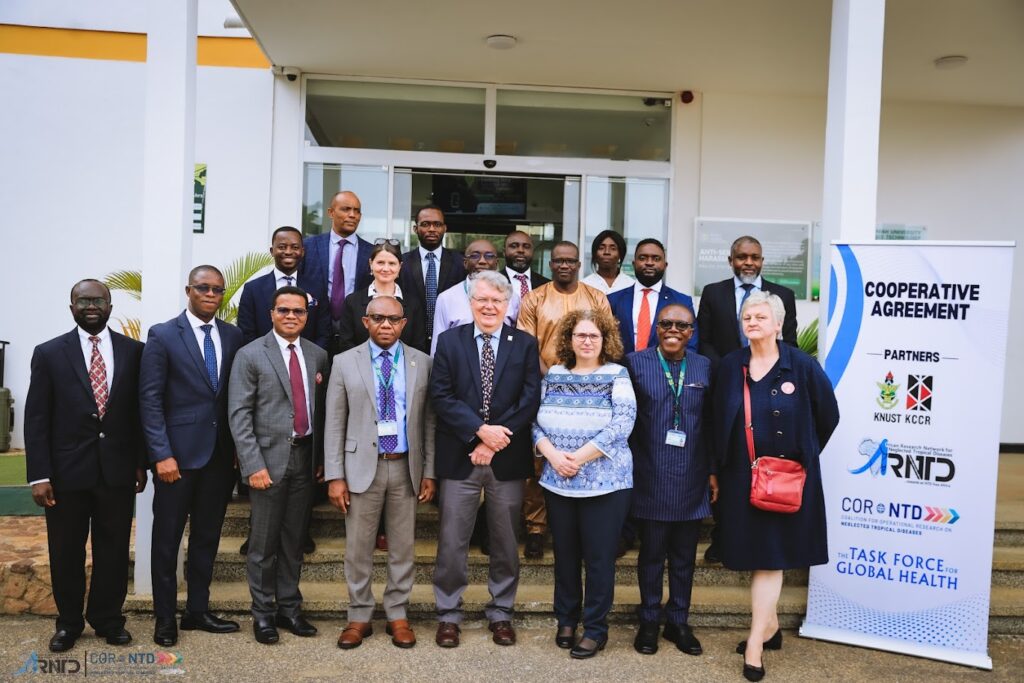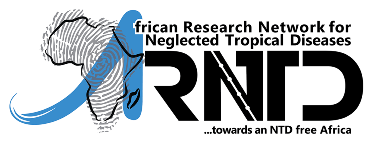The African Research Network for Neglected Tropical Diseases (ARNTD) celebrates a significant milestone in the fight against Neglected Tropical Diseases (NTDs) with the official signing ceremony of a five-year cooperative agreement with the Coalition for Operational Research on Neglected Tropical Diseases (COR-NTD), a program of the Task Force for Global Health.
This collaboration, funded under the newly signed United States Agency for International Development (USAID) cooperative agreement “Ending Tropical Diseases through Operational Research,” aims to address critical operational research challenges and enhance NTD diagnostics across the African continent.
Dr. John Amuasi, Executive Director of ARNTD, expressed his enthusiasm during the signing, ” This project will considerably enhance our capacity to support early career scientists and drive innovation in NTD control, elimination and eradication efforts.”
“We are poised to broaden our impact within this collaborative ecosystem, partnering with COR-NTD and the Task Force for Global Health. The intention is to enhance collaboration and provide context-driven solutions for the next generation of scientists. We are committed to continuing our contributions to various policies enacted at country levels, ensuring our research translates into tangible action against NTDs across Africa.”
Dr. Patrick Lammie, Director of the Neglected Tropical Diseases Support Center at The Task Force for Global Health, highlighted the broader implications of the agreement: “This signing represents the end of the first phase of COR-NTD’s partnership with ARNTD and begins a second phase which will have us as co-equal partners. We are looking forward to a long-term collaboration that establishes the substantial, consistent and true partnership between ARNTD and COR-NTD.”
He explained that the partnership aims to increase African-led NTD research, develop sustainable health solutions, and provide professional development opportunities for scientists in NTD endemic countries.
NTDs affect over a billion people worldwide, mostly in impoverished tropical areas. Caused by various pathogens, these diseases inflict severe health, social, and economic burdens. About 1.6 billion individuals need interventions to prevent or treat NTDs, demonstrating their widespread impact on global health.
The project is expected to support national governments in creating robust NTD programs by aligning efforts of endemic country program managers and researchers. This comprehensive approach addresses various consequences that have long plagued the poorest and most neglected populations
Professor Gertruida Hester O’Neill, Board Chair of ARNTD, pointed out how this new agreement aligns with the network’s foundational objectives. Reflecting on ARNTD’s origins, she recounted how it began with a group of fellows who, despite receiving small grants from European organizations, made significant strides in NTD research across Africa. This early success, Prof O’Neill explained, served as a catalyst, empowering these researchers to expand their efforts.
“Our vision was to extend this empowerment to researchers in Africa, creating a network that could drive progress,” she stated. “Looking at where we stand today, I’m truly happy. ARNTD is a unique network which will make a great impact in the fight against neglected tropical diseases through this new agreement,” she added.
The Pro-Vice Chancellor of KNUST, Professor Ellis Owusu Dabo, who hosted the event, stressed the importance of such partnerships. He concurred that the agreement exemplified the kind of sustainable collaborations KNUST stives for.
“This award aligns very well with our commitment to fostering research and development, particularly in critical health areas like NTDs,” he said
The Scientific Director of KCCR congratulated ARNTD and COR NTD on this achievement. Being a founding member of ARNTD and currently a member of the management bord, Prof Richard Phillips expressed pride in KCCR’s decision to host the secretariate when it was first formed 10 years ago. He promised that KCCR will continue to support ARNTD and make this project successful.
As ARNTD and COR-NTD embark on this new chapter with the “Ending Tropical Diseases through Operational Research” project, the future looks promising for NTD research and control efforts on the continent. The signing of this agreement represents a significant step towards a future where neglected tropical diseases no longer pose a threat to public health in Africa, bringing us closer to the goals outlined in the 2030 NTD roadmap.

“This award is a momentous milestone for ARNTD and the continent’s researchers, who will be directly contributing their research knowledge to helping meet the targets of the NTD 2030 roadmap,” said Dr. John Amuasi, Director of ARNTD.
“This partnership with Task Force allows us to rope in more African researchers, improve our reach towards the bottom billion, and deliver sustainable evidence-based solutions,” he explained.
“We are deeply honored to receive the ENDOR Cooperative Agreement from the U.S. Agency for International Development,” said Dr. Patrick Lammie, Director of the NTD Support Centre, a program of the Task Force.
“This award represents an important step forward in our support for USAID’s ambitious agenda to control and eliminate NTDs and underscores the importance of operational research in achieving sustainable solutions. Additionally, our expanding partnership with ARNTD will help us develop new collaborations with African researchers.”
ARNTD gratefully acknowledges the Task Force, USAID, and all stakeholders for their support and contribution.


